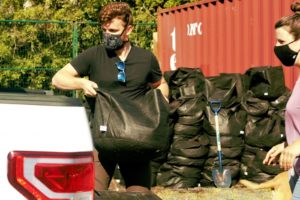A local non-profit organization is making it possible for everyone, including students, to have access to free produce. The Food Eco District (FED), a sustainable-dining district in downtown Victoria, started the My FED Farm project in 2020 in emergency response to the COVID-19 pandemic. The organization will install a garden and provide garden kits free of charge to accepted applicants. The kits are made up of seedlings for kale, lettuce, tomatoes, and other vegetables, as well as soil.
FED program manager Brianna Stewart says the program has a 500-kit goal this year; 250 kits have been delivered as of June 8. The program started as an emergency response when the pandemic first hit because there was fear that supply chains to Vancouver Island would be impacted.
“Everything kind of shut down, not only for the world, but for a lot of our programming, and we just wanted to see what we could do,” says Stewart. “At that time, also, there was quite a bit of concern around the supply chain for food, being on an island here. It turns out that we were safe, and we had lots of food coming, but I think there was huge interest in people getting involved with growing and self-sustaining.”

Beyond the nutritional value of growing and gardening, Stewart says it also helps to combat mental-health issues exacerbated by the pandemic.
“I think even more so than last year, believe it or not, I’m really seeing that people are suffering from mental-health issues… just isolation and the challenge through a pandemic,” she says. “And this can just be a way to connect and have a small win. Maybe you make one salad for yourself and you think, ‘I want to keep doing this.’”
Stewart says that growing food can be challenging, but it gets people out of their own head and gets them doing something.
“And hopefully engaging with a community that maybe you didn’t before,” she says.
The seedlings in the garden kits come from FED, donations from local residents, and the City of Victoria.
“They’ve got a big program that they do called Get Growing, Victoria! and they [grew] tens of thousands of seedlings,” says Stewart, “so we’ve got kind of a combination of our own and what we got from the City.”
Stewart says that while it’s unfortunate that healthy food is expensive, it does reflect what the prices should be.
“Local farmers—all farmers—should be able to make a living wage, so I think the prices of food are actually reflective of what they should be,” says Stewart. “It’s just unfortunate that our wages, our cost of living—there’s such a disparity there.”
If students are keen to grow but have limited space, pooling together space with a friend is a good option; if that doesn’t work, she says, get in touch with FED.
“Connect with us through our website and we might be able to point them in a direction where they can find space, or connect with other like-minded people that could help them,” says Stewart.
Stewart hopes that people supplementing by growing at home could be the answer.
“If you’re really into it, you can save your own seeds, and then you really don’t need to spend that much money,” she says. “It’s not that expensive to do, if you really want to put the effort into it—which I know we’re all busy; easier said than done—but there’s definitely cost-effective ways of growing food at home to supplement your diet.”
Students who want to be considered for a garden kit can fill out an application here. According to the site, those who received a kit last year are not eligible this year due to high demand.
